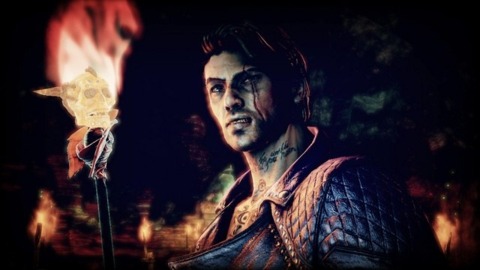New IP is the future - Shadows of the Damned director
Q&A: Massimo Guarini talks about the need to pursue new ideas, working with Suda-51 and Shinji Mikami, disappointing sales, and his new studio, Ovosonico.
When Grasshopper Manufacture's Shadows of the Damned launched in June, industry prognosticators could have backed up an argument for the game as a hit or a flop.
As a violent third-person shooter, the game was firmly ensconced in a popular genre. With a development team boasting the talents of Shinji Mikami, Suda-51, and Akira Yamaoka, Shadows of the Damned's pedigree was beyond reproach. Even the reviews were largely glowing.

On the other hand, Shadows of the Damned was a single-player game in an increasingly multiplayer-focused console market. It was a new intellectual property late in a generation's life span. With gameplay systems built around severed (but still braying) goat heads and sushi lamps--not to mention a predilection for anatomical jokes--its sensibilities were quirky, to say the least. And on top of that (or perhaps because of it), Shadows of the Damned was not aggressively marketed to mainstream audiences.
Whatever the reasons, Shadows of the Damned sales were disappointing. Earlier this month, the game's director, Massimo Guarini, revealed he was leaving Grasshopper to start up his own studio. GameSpot caught up with Guarini recently to ask him about Shadows of the Damned, his new studio Ovosonico, and some of the bigger-picture issues facing the game industry.
GameSpot: Why did you leave Grasshopper?
Massimo Guarini: My decision [to leave] Grasshopper has nothing to do with the low initial sales numbers of Shadows of the Damned. On the contrary, I would like to take this occasion to confirm I'm still in very good relationships with both Grasshopper and Electronic Arts. Leaving Grasshopper has just been a consequence of some events and private reasons that led me and my family to consider moving back to our country.
GS: What can you tell us about Ovosonico?
MG: Big changes in life happen for a reason, and this huge change in my life gave me the opportunity to review my plans and invest on something challenging like going independent. Ovosonico is steadily based on a very precise and strong vision. The entertainment business is rapidly changing into a blurred virtual space of different arts and disciplines converging together. Ovosonico, thanks to the interdisciplinary experience of its members, embraces this convergence and goes with the flow.
Making games is good, but creating real entertainment brands is even better, both in terms of revenue and creative expression. We understand the big limits of the old, traditional triple-A business model, and rather than opposing ourselves to the change, we embrace it, we take inspiration from it, coming out with new ideas. Ovosonico is definitely not the typical game development studio you would expect to see. I'd rather say it's what every game studio should become in the [near] future in order to stay in the business. It might sound like a bold statement, but we truly see this happening in front of our eyes.
Ovosonico will deal with games production for new platforms, as well as music productions and even movies, eventually blending all these elements in a single entertainment product. I want to keep the studio small, reactive, fresh, incredibly efficient, and quick. Those qualities will allow us to ride the changes as protagonists, rather than drowning in them. I am glad to have this rare opportunity to contribute in a proactive way to the growth of our industry, but most importantly to give players all around the world that fresh wave of oxygen they've been asking for a long time.

GS: What did you think of the critical reception to Shadows of the Damned? Were there certain aspects you were surprised got as much attention as they did?
MG: I was positively surprised when I noticed that almost everybody understood the tone of the game and approached it with the right spirit. To be honest, I was initially worried about what kind of critical reception such a different and crazy game could get. We had an incredibly good time creating it, writing the cheesy jokes, planning every single detail to match the B-movie/grindhouse style we wanted. That's probably why people and reviewers themselves got it. When you have genuine fun creating something, failure is very rare.
I was also positively surprised noticing how critics considered not taking itself too seriously like a big strength point of the game. I still receive many messages from fans and gamers all around the world, and it's quite amazing to see how this game has managed to engage people, putting a smile on everybody's face and making everyone feel refreshed. I am very happy about this. As a creator, this is the biggest reward I can get.
GS: What kind of commercial reception did you expect Shadows of the Damned to get?
MG: Quite frankly, I've never expected Shadows of the Damned to be a million-copies seller. We knew we were creating a niche title targeting a specific market. However, I definitely expected to see bigger figures than the ones I can see now.
GS: What do you think are the biggest reasons for that?
MG: Shadows of the Damned had a very long gestation. Before I joined Grasshopper, the game had already been in production for about 16 months. Original IPs developed with the traditional business model represent a huge risk and require big investments for appropriate promotion. Unfortunately, because of our excessively long development schedule, we couldn't get a big enough promotion budget to reach out to players in an effective way. Too many people didn't even know about the game's existence, but when friends and word of mouth dragged them in, they simply loved it.
GS: Working on this project with Suda-51, Shinji Mikami, and Akira Yamaoka, it seems like there would have been a lot of experienced people with a lot of concrete ideas about game development. How would you handle differences in opinion? Was it as "punk rock" as the rest of Grasshopper's image?
MG: Handling differences in opinions was not punk rock at all. Actually, we needed a very structured and organized approach in order to properly manage all the feedback coming from the volcanic minds of Suda, Mikami, and Yamaoka. Given the amount of big personalities involved in this project, the risk of turning the whole development into a real disaster featuring stylistic incoherence was really around the corner. Suda-51 was well aware of the risk and, in order to properly manage all the feedback, gave me the power, as the director of the game, to evaluate every request form them and decide whether to implement those in the game or not. This proved out to be a very efficient way for me to keep control over the project, but saying sometimes "no" to Mikami was really a scary experience. That was definitely punk rock. Even death metal.
GS: How bad are the prospects for single-player-only games right now?
MG: In my opinion, single-player-only games are nowhere close to being doomed. The problem rather lies in how they're produced, through which channels they're sold, and at which price points. I can't see in any way a single-player experience being less engaging or interesting because of the absence of multiplayer. Instead, I can definitely see how players who pay 60 or 70 bucks for a game can be quite sensitive to the lack of additional features that can justify their investment.
Once again, the business model must evolve. We're still selling at incredibly high price points because we're still operating like we were five years ago, with just higher production costs. Instead of changing our perspectives, we're still struggling to pack games with features, extras, bonuses, achievements, in order to barely justify that price tag, which is given by excessively high development and licensing costs. We must learn our lesson from the huge, epic failure the music industry is still suffering nowadays for not being able to adapt to the digital revolution.
GS: How do you think the difficulty of launching new intellectual property today will impact the industry tomorrow?

MG: The difficulty of launching new intellectual properties today is the obvious sign an era is ending. We are approaching the end of a cycle. On the contrary, the ability of launching new intellectual properties will actually be the industry of tomorrow. There is no market in the world that I am aware of that can survive without the constant injection of fresh, new products.
GS: You've developed games around the world now. What do you see as the big differences between Western and Japanese development? What are the differences between the Western and Japanese audiences?
MG: Based on my experiences, Japanese development tends to be characterized by a creative overwhelming chaos, where productions are often driven by a tyrannical single creative mind and development practices tend to be quite old-fashioned and, at times, extremely inefficient. On the other hand, Western development is generally characterized by an efficient, well organized, risk-averse sort of democracy; actual creativity and strong vision get diluted, if not sometimes completely lost, in endless brainstorming sessions driven mainly by market analysis rather than creators.
I believe Japanese and Western development are deeply complementary. They both have strengths and weaknesses. Having had the great opportunity of working in Europe, North America, and Japan, I do believe that Ovosonico could be this rare and unique occasion for taking the very best from every development culture and blending it to give birth to an extremely competitive and unique reality.
Remnant 2 - The Forgotten Kingdom | DLC Launch Trailer Stellar Blade - Official "The Journey: Part 2" Behind The Scenes Trailer | PS5 Games Fortnite Festival - Official Billie Eilish Cinematic Season 3 Trailer Dead by Daylight | Tome 19: Splendor | Reveal Trailer Destiny 2: The Final Shape | Journey into The Traveler Trailer 2XKO - Official Illaoi Champion Gameplay Reveal Trailer Marvel Rivals - Official Loki Character Reveal Trailer | The King of Yggsgard Starship Troopers: Extermination - Official "The New Vanguard" Update 0.7.0 Trailer Solo Leveling: Arise - Character Gameplay Teaser #15: Seo Jiwoo Genshin Impact - Character Demo - "Arlecchino: Lullaby" Goddess Of Victory: Nikke | Last Kingdom Full Animated Cinematic Trailer Metaphor: ReFantazio The King’s Trial Trailer
Please enter your date of birth to view this video
By clicking 'enter', you agree to GameSpot's
Terms of Use and Privacy Policy
Got a news tip or want to contact us directly? Email news@gamespot.com
Join the conversation